Legalizing hemp on the Navajo Nation could be good for business, but would marijuana follow?
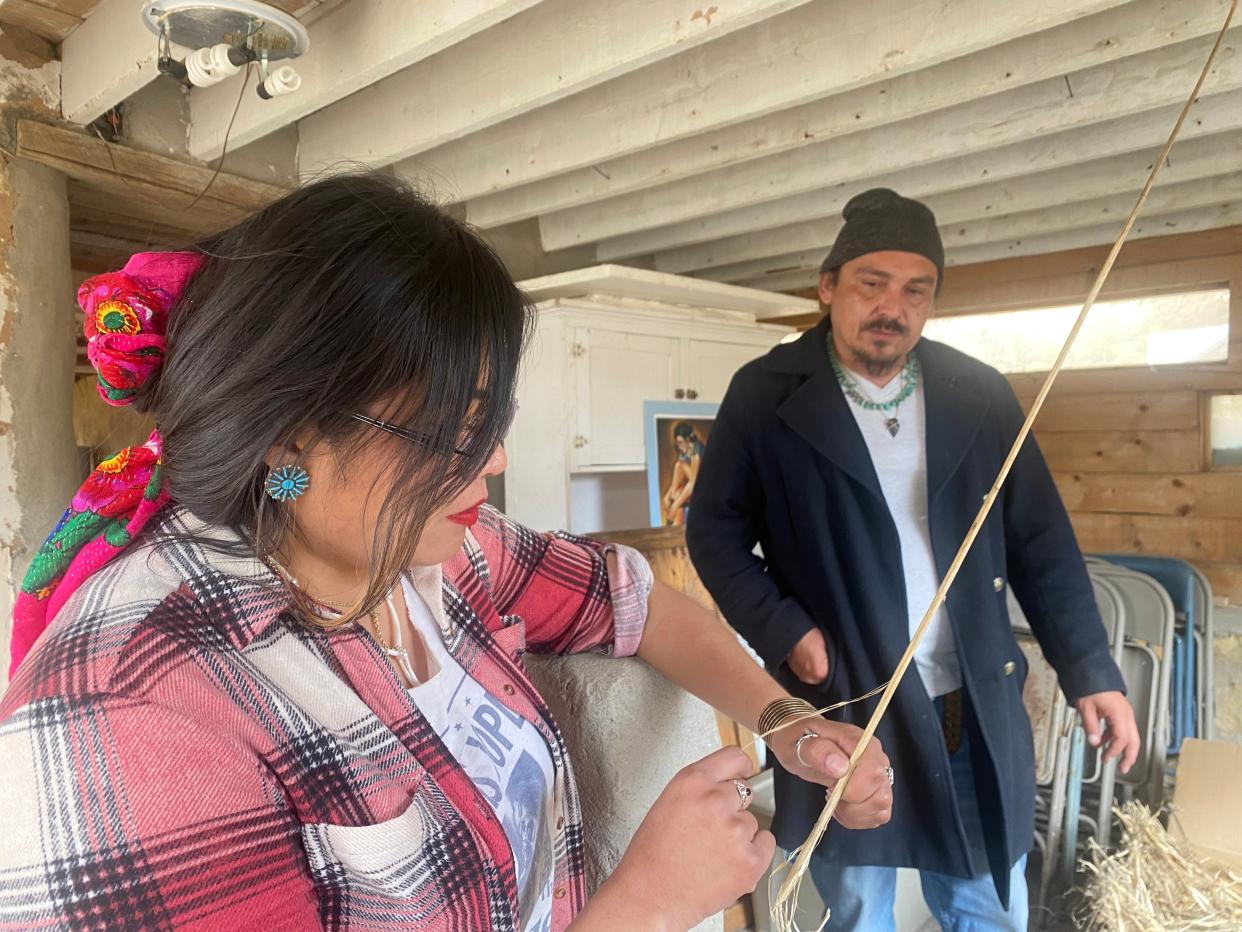
Ira Vandever recognizes benefits of hemp cultivation. He wants to mix wool from the churro sheep with hemp to weave into beautiful Navajo rugs. He has plans to make hemp into paper. And he sees it as a viable tool to help clean up the over 500 abandoned uranium mines on the Navajo Nation, starting at his community of Haystack, New Mexico, where uranium mining on Navajo began.
There is one huge obstacle: Hemp, like cannabis and alcohol, is illegal on the Navajo Nation.
But Vandever says he won’t let that stop him from attempting to use hemp in ways he sees as advantageous for the Navajo people, while also working toward changing the law on the Navajo Nation to allow hemp cultivation.
“It’s a whole economy they rejected and criminalized,” said Vandever of Navajo leadership. “So we teamed up with some people to write the code to say this is how hemp should be decriminalized.”
Vandever has dabbled in different careers, working with Tsehootsoi Medical Center, owning a restaurant in Ramah, N.M., and at one point opening a small coffee shop inside the Navajo Nation Museum in Window Rock. Now his efforts are going toward hemp cultivation and production.
"I started because on our side is the uranium mines," said Vandever. "Almost 500 abandoned mines. The hemp pulls out all the toxins from the ground naturally. We started that and it was the first pilot project."
The uranium mines, abandoned by the mining companies and federal agencies for decades, left behind a deadly legacy for people, animals and the land.
Family, community and culture are also priorities for Vandever and he saw opportunities that could come with the hemp cultivation.
"We combined the fiber with wool and teamed up and made a Navajo rug," said Vandever.
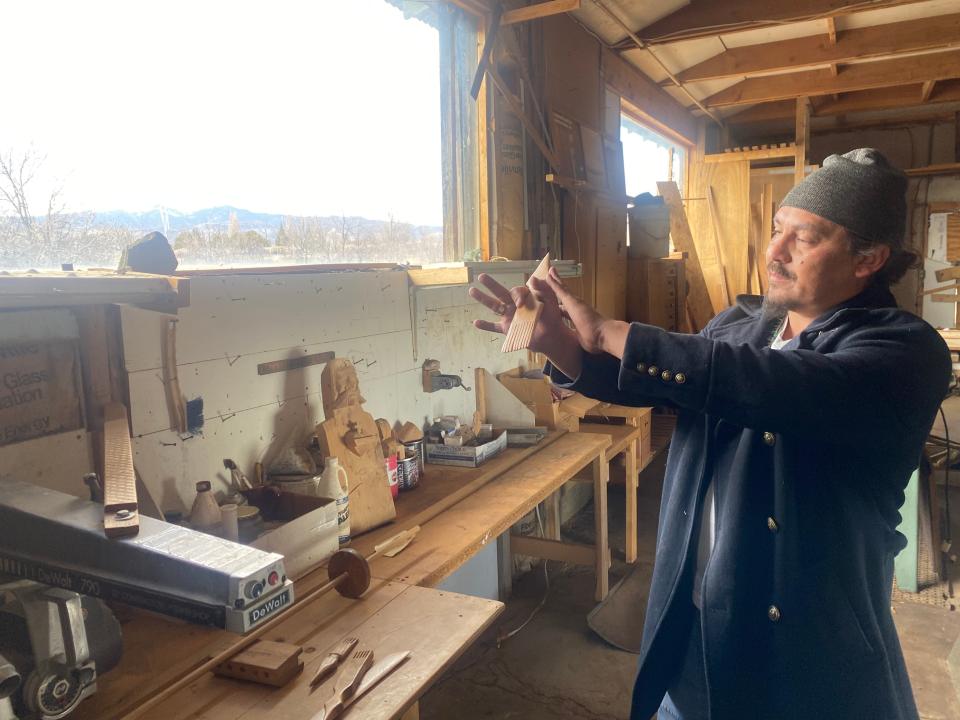
Master rug weaver Roy Kady sold the rug for thousands of dollars more than he normally does because the buyer saw the value of the hemp used along with the wool. Vandever's own anti-hemp aunt, who is also a weaver, jumped on board after weaving her own rug with hemp and wool and selling it for a lot more than normal.
"The lady who bought it said 'I know the value of this because the hemp will last 500 years more than what we have now,'" said Vandever of Kady's rug.
But Vandever's vision for hemp is larger. He plans to name the property after its former owner. It will be an incubation hub called the Federico Armijo Arts and Cultural Center. There, they will eventually teach anyone who wants to learn how to build items like weaving tools and looms with hemp, among other things.
"We are going to build stuff, innovate stuff," said Vandever. "Make cool things. We are trying to teach people how to do things with the best materials and best techniques by hand."
Although the Navajo Nation has shown interest in hemp cultivation and production on its tribal lands, an illegal operation in northwest New Mexico led Navajo leaders to tighten laws that prevent anyone other than a public university to plant and study hemp.
Vandever is only advocating for hemp to be legalized, but some people believe not only hemp should be legalized, but marijuana as well, a move they say would offer the Nation a new business opportunity.
A hemp farm leads to laws
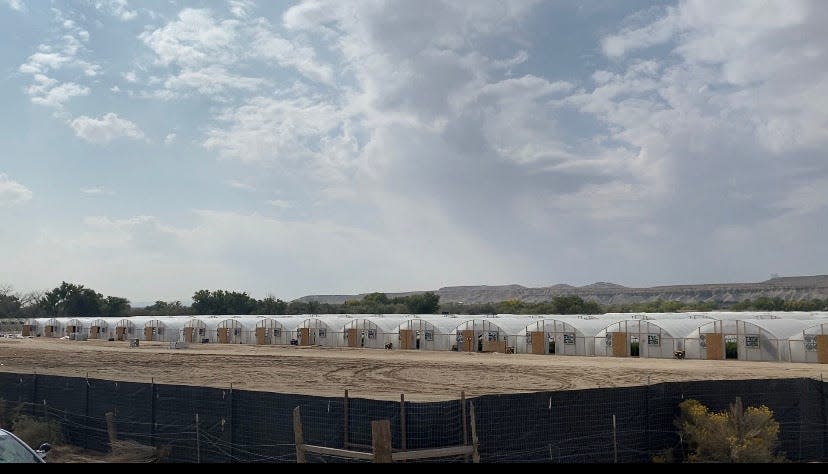
The history of hemp on the Navajo Nation took a turn about three years ago. In 2019, New Mexico State University persuaded the Navajo Nation Council to give the school authority to conduct a pilot project growing hemp at Navajo Agricultural Products Inc., a Navajo enterprise located on tribal lands close to the border town of Farmington, N.M. The aim of the project was to determine the ultimate viability of future hemp production on Navajo.
After clearing obstacles from local communities and Navajo leaders, NMSU won approval to cultivate hemp for one project, which started out on 200 square feet, and expanded in 2020 to 5 acres.
Meanwhile, in 2020, a massive hemp and marijuana farm sprouted up near the community of Shiprock, N.M., first in the backyard of current Navajo Nation presidential candidate Dineh Benally. Authorities said he was growing marijuana along with the hemp and moved to shut down the operation.
After the incident, at least 32 land-use permits were canceled by the San Juan River Farm Board, a board that Benally served on as president during the hemp cultivation. The shutdown affected 32 Navajo farmers who were a part of the operation, growing hemp and marijuana.
“The way it was done wasn't good,” said Council Delegate Mark Freeland. “There’s a right way to do things and there’s a wrong way. And that was the wrong way. It would’ve been a possible avenue of a revenue source.”
Eventually, because of the illegal cultivation, Freeland and the rest of his 23 council colleagues amended Title 17 of the Navajo Nation Criminal Code.
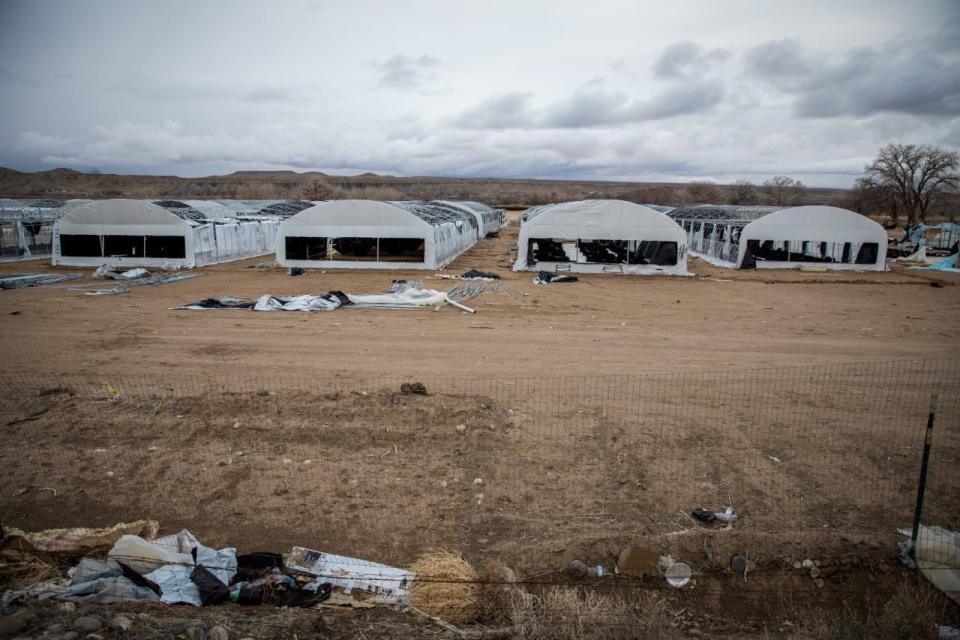
Under the definitions of “controlled substances,” marijuana is now defined as all parts of cannabis containing any amount of THC. Because hemp is a strain of cannabis with at least 0.3% or less of THC content, it was criminalized on Navajo, except for certain researchers. The report on the NMSU pilot project isn't completed, but Freeland said he wants to request a presentation on it.
“Hemp is an industrial product that had previously been treated differently from marijuana under federal and Navajo Nation law,” Attorney General Doreen McPaul said in an email to The Republic. “Marijuana has always been a prohibited substance on the Navajo Nation, this remains true regardless of any changes to state marijuana laws in Arizona, New Mexico or Utah.”
Within the three states the Navajo Nation spans, marijuana laws vary. Medical and recreational marijuana is now legal in both Arizona and New Mexico. In Utah, recreational is illegal and medical marijuana is legal with stipulations. Colorado, a close neighboring state, has legalized both medical and recreational marijuana.
Hemp operations: Navajo Nation moves to shut down farms amid claims of marijuana growing
'We are doing this for our kids'
The actions of the Navajo Nation Council in 2019 and 2020 excluded any entity other than Navajo Agricultural Products Inc. from conducting a pilot program to grow hemp and specifically clarified that all other hemp production remained prohibited on Navajo. The council amended the Navajo Controlled Substance Act to specifically ban all hemp production, with the exception of NAPI, McPaul said.
Vandever, his sister Shaylee Vandever and others are working to legalize hemp by developing new language for a bill they hope Navajo leaders will consider. To avoid breaking any Navajo Nation laws regarding hemp, Ira Vandever has bought a piece of land in Cubero, New Mexico, where hemp cultivation is legal, to work on their vision. The hemp growing hasn't started yet, and for now Vandever is processing hemp sent to him from Minnesota.
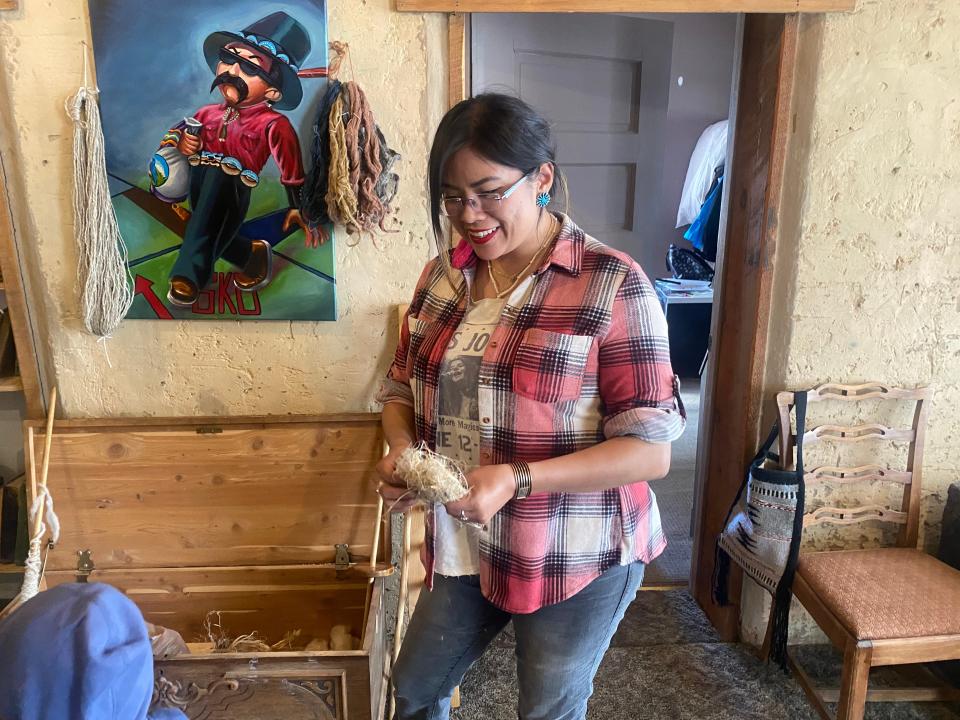
“It’s really a collaborative effort,” said Shaylee Vandever. “A lot of us came together and we are really getting innovative with hemp. We aren't doing this for us, we are doing this for our kids. We don't want them suffering seven generations in the future.”
Not far from Haystack, Vandever purchased an old home along with a piece of land where the house and other structures sit to help build his hemp cultivation operations.
Vandever credits a workshop he attended held by Winona LaDuke, an environmental activist and hemp grower who has worked with tribes. The annual Indigenious Hemp Conference is held on the White Earth Reservation in Minnesota, where hemp cultivation is legal.
“They brought all these Indigenous people together in this small area in Minnesota and it was like a think tank,” said Vandever.
Navajo officials stand firm on policies
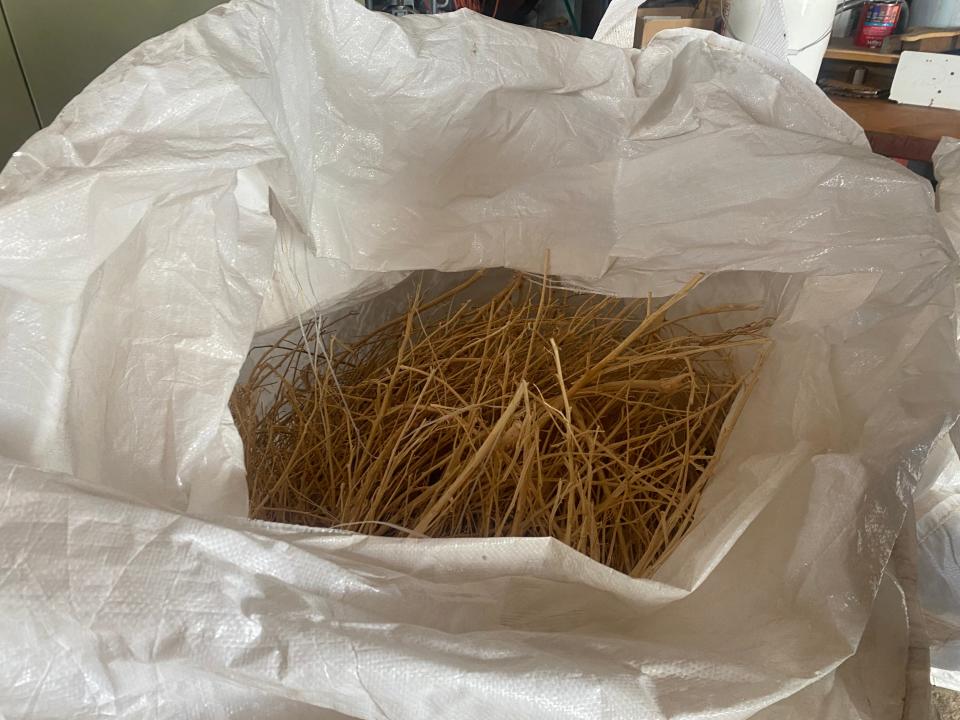
As Arizona, New Mexico and Colorado have legalized both recreational and medicinal marijuana, Navajo officials have stood firm with the decision not to legalize marijuana or hemp.
“You have to look at it from all angles,” said Freeland, the council delegate. “You have to look at the social impacts. Look at the traditional view, what do the elders think? Everything needs to be taken into consideration.”
Freeland, who represents Navajo chapters in New Mexico, said he told New Mexico Gov. Michelle Lujan Grisham that New Mexico never consulted with the tribes on the legalization of marijuana.
“The state has a law that if anything like this happens, the states have to consult with tribes and we never received that consultation,” said Freeland. “My situation is there could be dispensaries close by liquor stores. There could be a black market situation, and it could become territorial. Those are the realities that I was thinking about.”
Even if Vandever is only interested in legalizing hemp, the possibility of tribes legalizing medical or recreational marijuana and operating dispensaries in Arizona has raised questions.
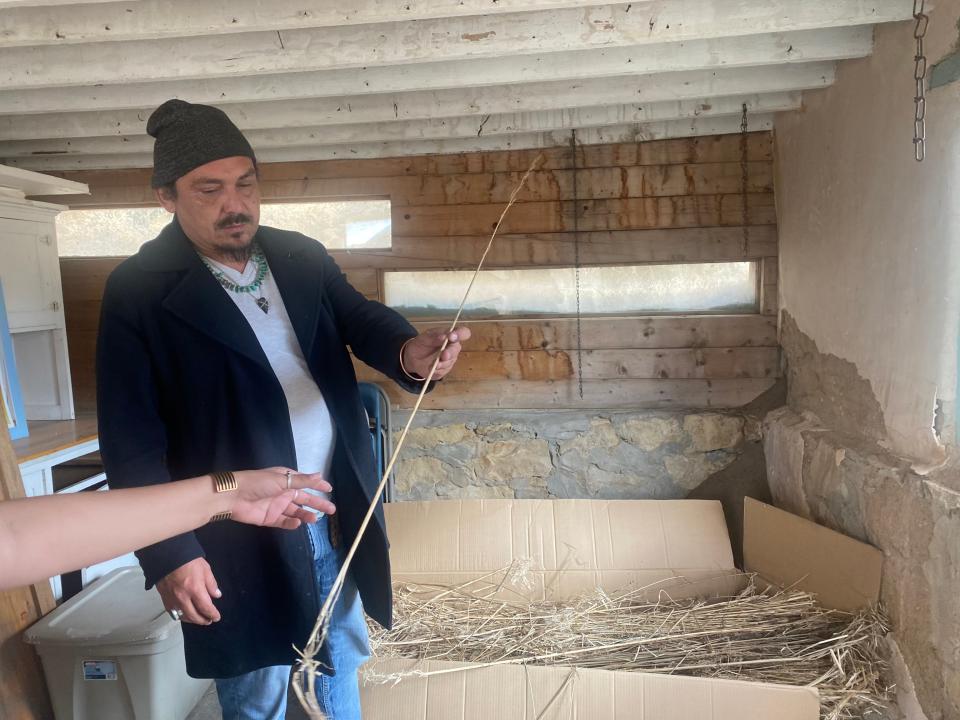
Verrin Kewenvoyouma, attorney at Kewenvoyouma Law, a Tempe-based firm focused on the practice of Indian law, said with over 530 tribes in the country, the discussion of decriminalizing medical marijuana to operating dispensaries for recreational use on tribal lands is well under way.
“It varies significantly,” said Kewenvoyouma. “There are a lot of things, besides legal consideration, that is being put into these decisions like mostly and mainly what tribes' values are with respect to their perception on marijuana.”
Kewenvoyouma said when it comes to the business side, figuring out what the market for marijuana would look like for tribes who want to pursue it is another factor.
“A rough comparison is that you can look at casino gaming in various places,” said Kewenvoyouma. “There are places where you have 1,100 machines and there are places where you have none because there is no market for it. So even if tribes want to do it, can they do it? Do they have the market for it?"
The benefits for tribes could not only bring more dollars into the economy, it could also drive down high costs in dispensaries that are seen throughout Phoenix.
Marijuana sales: Despite state legalization, marijuana is still illegal on Navajo, Gila River nations
Jonathan Udell, political director of the group Arizona NORML and co-chair of the cannabis department at Rose Law Group, said he’s surprised tribes in Arizona aren’t taking the initiative to get into the marijuana business, as opposed to other tribes in the country that have welcomed it.
“It could provide a nice revenue for tribes,” said Udell. “And for tribes in Arizona, I think it's an even more appealing proposition because there are so few dispensary licenses here. It’s one dispensary for every 10 pharmacies in the state and as a result of that there are very high prices in Arizona.”
Arizona dispensaries are competing with the black market and, as a result, prices are high and dispensaries are reaping massive profits because of how much they can charge, Udell said. The monopoly in place now is in need of competition and he believes tribes that sit outside of the city limits could be that competition.
Some tribes in California currently own recreational dispensaries, such as Mountain Source Dispensary that opened east of San Diego in 2019, operated by the lipay Nation of Santa Ysabel on their tribal lands. All products meet the California and San Ysabel Tribal Cannabis Regulatory Agency regulations and standards.
Currently, the Pojoaque and Picuris Pueblos of northern New Mexico, are inching closer to recreational marijuana involvement. The tribes signed an agreement with New Mexico recognizing the tribe's authority to collect taxes on sales of cannabis products.
Questions remain about legalization
In South Dakota, a referendum with the Oglala Sioux Tribe to legalize medical and recreational marijuana on the Pine Ridge Reservation passed and allowed for the tribe to take control of how it will cultivate and operate its own cannabis business.
Jenny Big Crow, a citizen of the Oglala Sioux Tribe, said it's imperative to only have enrolled tribal members participate in the business because she has seen non-tribal members profit from their lands in various ways. She said getting a lawyer to help with developing laws and language that will only benefit tribal members is a must, and she has offered to consult with other tribes.
"We also made sure that you have to be 100 percent enrolled member," said Big Crow. "We needed to make sure that guys don't just come in, we know they're already stealing from us in different areas on our reservation like with ranching, using our land, they are finding ways around our laws. It usually follows back to white people who have no ties to the Native community except wanting money."
On the Navajo Nation, nothing is in place regarding economy of marijuana. JT Willie, director of the Navajo Department of Economic Development, said the tribe does not have any estimated fees or taxes related to the production or sale of recreational marijuana. It would need to develop a strategy that recognizes the growing of marijuana on particular parcels, which would involve exporting fees for goods, taxation on those goods being sold for distribution, and wholesale waivers.
The Navajo Nation would also need to amend taxing jurisdictions on the sale of marijuana goods in retail store settings. If there is a regulation in place for retail on the Navajo Nation, the tribe would need to develop that taxing law on public marijuana sales on Navajo Nation land.
Also, sales of marijuana are only acceptable on a cash basis because of governmental restrictions on banks. The tribe would need to develop a risk factor for cash floating around Navajo Nation for this type of sale, which means the business insurance rate would be another factor, said Willie.
“Navajo Nation in comparison to other tribal lands is unique because of the government structure and local chapter governance jurisdiction, therefore it would be difficult to compare 110 chapters to another tribal nation on the stance of marijuana,” said Willie.
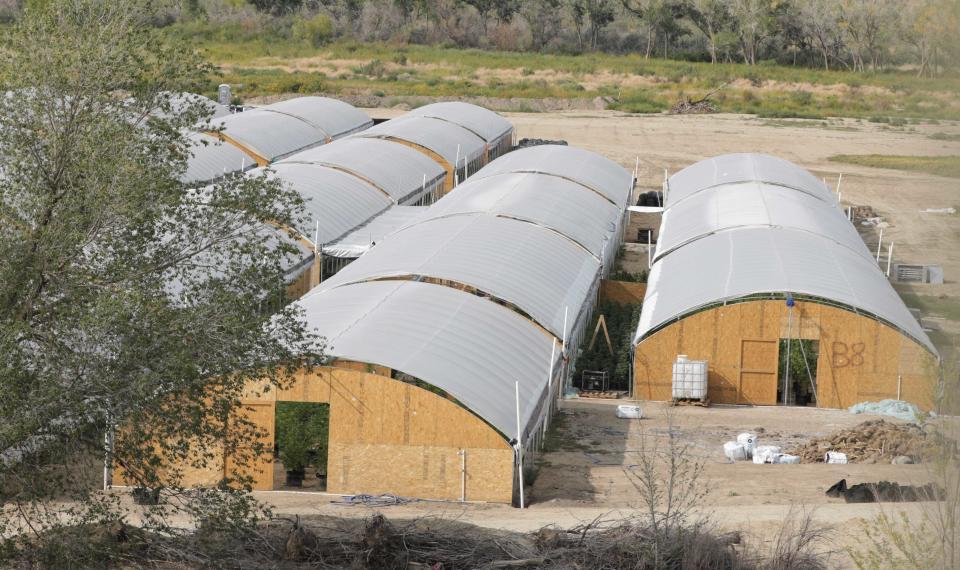
With the presidential elections under way, some people are surprised that no one is mentioning the Shiprock hemp and marijuana farms. McPaul, the attorney general, hasn't responded to questions on the status of the situation in regard to the farmers and Benally.
Ira Vandever and Shaylee Vandever agree that there were mistakes in the way the illegal marijuana farms were cultivated in Shiprock, because they see it as a medicine and the way it was grown takes away from the plant medicinally. Vandever's approach to cultivation of hemp is to leave as little carbon footprint as possible, and do it by hand.
The siblings believe the Navajo Nation government used scare tactics around hemp and set the tribe back 10 years. They also see an attempt to later capitalize on hemp and monopolize it to keep citizens from trying to grow it themselves.
"It's a disservice to the people, a lack of thorough research on what separates hemp from cannabis," said Shaylee. "If there were experts who are employed with the legal, criminal system, If there were people there to say what is cannabis and hemp, then that would've been helpful. But what has grown from that situation is propaganda."
Arlyssa D. Becenti covers Indigenous affairs for The Arizona Republic and azcentral. Send ideas and tips to arlyssa.becenti@arizonarepublic.com. Follow on Twitter @abecenti.
Support local journalism. Subscribe to azcentral today.
This article originally appeared on Arizona Republic: If hemp is legal on the Navajo Nation will marijuana follow?

